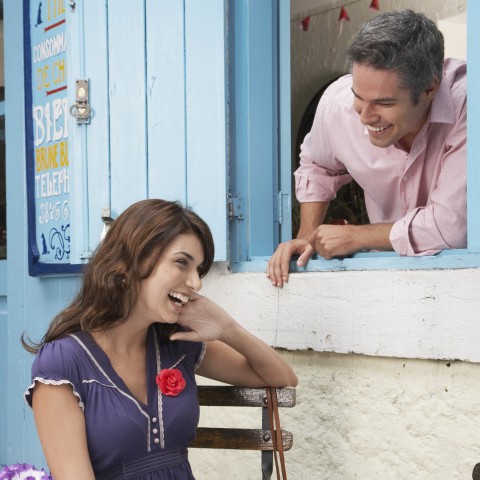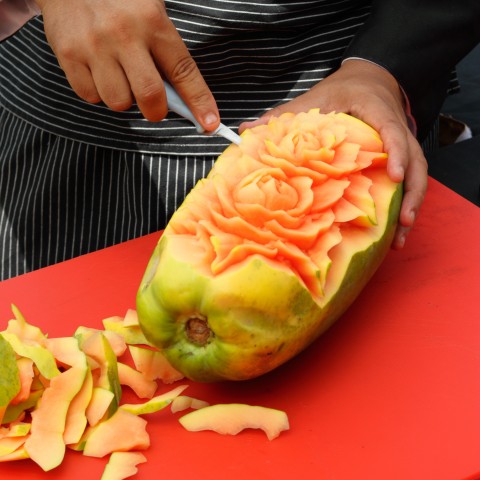Who doesn’t love receiving compliments?! If they’re sincere, they can make our whole being light up like a Christmas tree.
Giving compliments also has benefits, and Afrikaners know this! Praising people makes us feel connected to them, and this improves our own sense of well-being. After all, South Africans believe in and uphold the spirit of ubuntu. This popular philosophy implies that our own humanity is only fulfilled through the recognition and appreciation of another’s uniqueness and humanity.
So, spread ubuntu by learning to give Afrikaans compliments (komplimente) like a native speaker at AfrikaansPod101.com—we make it fast, easy, and fun!
- Why is it Important to Know How to Give and Receive Compliments in Afrikaans?
- How Can AfrikaansPod101 Help You Learn Important Afrikaans Compliments?
1. Why is it Important to Know How to Give and Receive Compliments in Afrikaans?
Before we start, let’s first look a bit at the importance of giving sincere compliments.
Let’s look at what the research says.
According to studies, compliments and praise can have the following effects:
1) It can boost one’s efficiency at work.
2) It can make you feel more efficient.
3) You will act and work more autonomously if you get praised often.
4) Praise increases a sense of well-being in both the compliment giver and the receiver.
5) Compliments have been shown to be a good incentive for task engagement.
6) Praise and compliments increase motivation, which, in turn, accelerates motor skill performance.
7) We also know that by focusing on the positive in our lives, we feel better about ourselves, others, and the world.
These are seven excellent reasons to start dishing out Afrikaans compliments, isn’t it?
But…and this is an important “but”…
A) Compliments and Praise Must Be Sincere
Most South Africans, including Afrikaners, are gregarious, generous people with big hearts. They love to celebrate good stuff—it’s ingrained in their culture.
Look, for instance, at a movement that’s recently taken South Africa (and the world) by storm!
#ImStaying was started on Facebook as an initiative for South Africans to be consciously and deliberately positive about their country. South Africa is still, even after decades of being a true democracy, in recovery from its very painful past of gross human rights infringements. Even in the face of slow but sure improvement, many still feel negative, even hopeless, about their future and lives.
#ImStaying proved a fast-growing and fast-moving social media phenomenon, with many South Africans from literally everywhere connecting through positive and complimentary attitudes toward each other.
This is because giving compliments in Afrikaans, or in any of the other ten national languages, turns out to come quite naturally for South Africans. Many even report that the group changed their lives.
Yet Afrikaners expect the same transparency and strength of character if you want to win their friendship and trust, and most of all, their respect.
“What you see is what you get” is a fairly common cultural trait, and they expect the same from others.
Also, insincere flattery won’t get you far. In fact, this and other false behaviors are probably the easiest ways to lose an Afrikaner’s trust and respect. They’re not alone in this.
In an interview with Huffingtonpost Australia, Professor Nick Haslam (School of Psychological Sciences, University of Melbourne) explained that false compliments are likely to have the opposite effect as genuine ones.
According to Haslam, those on the receiving end of false flattery will often sense the insincerity and perceive the compliments as ill-intentioned. This will undermine any positive effects a person might feel about being praised, he said.
So, rather stay real!
Now that we got that out of the way, let’s engage in the feel-good stuff. These are the best Afrikaans compliments to memorize.
B) Complimenting Someone’s Appearance
Especially when we’ve taken extra care with our appearance, we want others to notice it and comment favorably. Here are some good compliments (and pick-up lines!) in Afrikaans.
1) Jy lyk goed vandag/vanaand. (“You’re looking good today/tonight.” )
This is an understated and gender-neutral compliment in Afrikaans that any Afrikaner will appreciate. As long as it’s delivered with respect and the appropriate personal distance, you can also use this one at work.
Afrikaner men aren’t used to being complimented on their appearance, but they’re not immune to its mojo! This phrase is probably the one you’d want to use.
Making it Stronger…
One way to make this compliment in Afrikaans stronger is by adding and emphasizing regtig (“really” ) or baie (baie translates literally as “a lot,” but in this case, it means “very” ), as in:
- Jy lyk regtig goed vandag. (“You look really good today.” )
- Jy lyk baie goed vandag. (“You look very good today.” )
If you’re truly blown away by the person’s appearance, you could even add both regtig and baie:
- Jy lyk regtig baie goed vandag. (“You look really very good today.” )
2) Jy lyk mooi! (“You look pretty!” )
This common Afrikaans compliment can serve well as platonic and romantic praise. The phrase is usually directed at women and/or girls. Female friends and colleagues are more open in their exchange, and they use this compliment often and spontaneously.
Making it Stronger…
To add strength to this compliment, you could again add regtig and baie, just like in the examples above.
- Jy lyk regtig baie mooi! (“You look really very pretty!” )
Or, you could just say: Jy lyk baie mooi! (“You look very pretty!” )
Other words you can replace mooi (“pretty” ) with include:
- pragtig (“beautiful” )
- verruklik (“enchanting” )
- asemrowend (“breathtaking” )
- beeldskoon (“gorgeous” )
Note: These adverbs are already the superlative form of mooi (“pretty” ). They’re generally eloquent enough for Afrikaners, so, unlike in English, you won’t use baie (“very” ) to enhance their impact. However, you could add regtig (“really” ), if you prefer.
- Jy lyk regtig pragtig. (“You look really beautiful.” )
3) Being Specific
When someone has taken extra care with a specific aspect of their appearance, it’s only good manners and social etiquette to compliment them on it. Also, it could make their day!
Speak up, for instance, when it’s clear that someone has visited the hairdresser or bought new clothes.
3.1 At Work
It’s necessary to be careful about how you compliment someone at work. Boundaries can be easily overstepped, unfortunately. So, don’t get too personal with your praise, unless you and a colleague are also social buddies.
Yet few things oil the wheels of pleasant working relations like compliments! So here’s how to go about giving compliments in Afrikaans while at work:
It’s best to treat men and women equally by phrasing the compliment in a somewhat muted, almost formal manner.
- Jou hare lyk goed. (“Your hair looks good.” )
- Is dit ‘n nuwe uitrusting? Dit pas jou goed. (“Is this a new outfit? It fits you well.” )
- Ek hou van jou jas. (“I like your coat.” )
- Jy het ‘n mooi hemp aan. (“You’re wearing a nice shirt.” )
- Daardie rok lyk goed aan jou. (“That dress looks good on you.” )
3.2 At Home or on a Date
In informal situations, with people you know well, you can be more effusive!
- Jou hare lyk fantasties! (“Your hair looks fantastic!” )
- Ek is mal oor jou rok. (“I’m crazy about your dress.” )
- Jy het die mooiste tande! (“You have the prettiest teeth!” )
- Jy is die mooiste vrou met wie ek nog ooit uitgegaan het. (“You are the prettiest woman I’ve ever dated.” )
- Jy ruik lekker. (“You smell good.” )
- Jy het sulke mooi oë. (“You have such beautiful eyes.” )
- Jou glimlag is pragtig. (“Your smile is beautiful.” )
- Wow, jy’t groot spiere! (“Wow, you have big muscles!” ) Note: Avoid telling this to a woman. Unless she’s a bodybuilder, of course.
C) Afrikaans Compliments for a Job Well Done
The majority of adults spend most of their lives working. Therefore, being complimented for what you’re doing feels really good!
Here are some of the top Afrikaans compliments to use when someone has excelled at their tasks. The compliment is often an expression of gratitude as well.
1) Dankie vir jou werk. (“Thank you for your work.” )
This is a thank-you that also serves as a gender-neutral, understated Afrikaans compliment. It can be delivered either in person, or in a written note.
Making it Stronger…
Adding baie before dankie will strengthen this phrase. In this case, it translates as “very much.” To the same effect, you could also add harde (which means “hard” ) in front of werk.
- Baie dankie vir jou harde werk. (“Thank you very much for your hard work.” )
Note: This stronger phrase is somewhat nuanced, as it sounds less obligatory, indicating that you really mean it. If you rarely give compliments at work, though, the first, less embellished phrase is perfectly fine.
2) Goeie werk. (“Good/nice job.” )
Depending on how effusive your delivery usually is, and how you compliment other staff, this terse compliment could come across as a veiled insult.
Or, it could simply be a muted but sincerely meant compliment. Gauge the situation wisely, and make it stronger by adding baie, as in:
- Baie goeie werk. (“Very good job.” )
Baie goeie can be replaced with the following superlatives:
- uitstekende (“excellent” )
- fantastiese (“fantastic” )
- indrukwekkende (“impressive” )
- uitstaande (“outstanding” )
3) Geluk, dis uitstekende werk. (“Congratulations, that’s excellent work.” )
This phrase adds a congratulation, and is quite strong and expressive. Best save this for work that’s exceptionally well-executed.
Again, emphasize your amazement with a brilliant piece of work by adding baie:
- Baie geluk, dis uitstekende werk.
There’s no common English equivalent for this expression, but it literally translates as: “Many congratulations, it’s excellent work.”
4) Jy’t fantasties goed gedoen. (“You’ve done fantastically well.” )
This is a less formal compliment on a job well done, probably better suited for a more informal work environment.
Also, that Afrikaans friend who attained her medical degree with honors? Or your Afrikaans neighbor’s daughter who performed her first piano concert to great acclaim? Use this phrase to acknowledge and compliment their accomplishments.
Making it Stronger…
If you feel almost overwhelmed with admiration, you could add regtig to this Afrikaans compliment:
- Jy het regtig fantasties goed gedoen. (“You have really done fantastically well.” )
Depending on your relationship with the receiver, you could add a phrase like: Ek is beïndruk. (“I am impressed.” )
Note: If you’re a parent, lecturer, or teacher complimenting someone on a brilliant assignment or excellent grades, adding this phrase would be a personal touch that can be very encouraging. This is also the case if you have a fairly personal, almost mentoring relationship with the person.
However, be sensitive about how you use it, because some could construe it as patronizing. It’s probably best not to compliment, for instance, your CEO on his work performance with this phrase.
5) Other Commonly Used Afrikaans Compliments for Good Work
- Wonderlike idee! (“Wonderful idea!” )
- Ek het gehou van jou presentasie. (“I liked your presentation.” )
- Goed waargeneem. (“Well observed.” )
D) Complimenting Someone’s Skills in Afrikaans
Sometimes someone exhibits exceptional skills. This is how you show your admiration and compliment them in Afrikaans.
1) In the Kitchen:
- Jy is ‘n wonderlike kok. (“You are a wonderful cook.” )
- Die gereg is uitstekend voorberei. (“The dish is excellently prepared.” )
- Dankie, dit was heerlik! (“Thank you, that was delicious!” ) Note: This can be used formally or informally.
- Dankie vir die lekker kos! (“Thank you for the tasty food!” ) Note: This is a more informal compliment.
- Ek het baie lekker geëet, baie dankie! (There’s no direct translation, but it means: “I’ve really enjoyed the meal, thank you very much!” )
- Jy maak die beste koffie onder die son. (“You make the best coffee under the sun.” ) Note: Replace koffie (“coffee” ) with any beverage or food for a heartwarming compliment.
2) In the Garden:
- Jy het groen vingers! (“You have green fingers!” ) Note: This compliment means exactly the same in English; the person is an exceptional gardener, or they can make any plant grow or flourish.
- Jy het die gras goed gesny. (“You mowed the lawn well.” )
- Die blomme is wonderlik gerangskik. (“These flowers are wonderfully arranged.” )
3) In the House:
- Jy het ‘n slag met binneshuise versiering! (“You have a knack for interior decorating!” )
- Jy’ het hierdie kamer so mooi reggemaak. (“You fixed this room so beautifully.” )
- Ek dink jy het baie goeie smaak. (“I think you have very good taste.” )
4) General:
- Jy praat Afrikaans asof dit jou voertaal is. (“You speak Afrikaans like it’s your mother tongue.” )
- Jy praat Afrikaans soos ‘n Afrikaner! (“You speak Afrikaans like an Afrikaner!” ) Note: The former is the more formal version of this compliment.
- Jy tokkel die klavier soos ‘n meester! (“You play the piano masterfully!” ) Note: Tokkel is a casual word that refers to piano playing. It may have been derived from “tickle the keys,” also a reference specific to piano playing. This is a genial, humorous compliment.
- Jy het vele talente. (“You have many talents.” )
- Dans jy professioneel? (“Do you dance professionally?” )
- Jy het ‘n goeie sin vir humor. (“You have a good sense of humor.” )
- Jy het ‘n slag met woorde. (“You have a way with words.” )
E) Behavior and Body Language
Afrikaners love receiving sincere compliments, as said. Only the most arrogant celebrities are immune to this!
When you deliver a compliment, a warm smile while looking the person in the eye will, in most cases, be the appropriate body language and behavior. Your open admiration or appreciation will probably elicit a shy smile, embarrassed laughter, and muffled self-deprecation from most South Africans. Simply assure them that you mean it, and enjoy feeling good because you made someone else feel great!
2. How Can AfrikaansPod101 Help You Learn Important Afrikaans Compliments?
Which is your favorite Afrikaans compliment? Tell us in the comments!
Learning how to give compliments in Afrikaans is easy and fun, just as we designed it to be! With over a decade of experience, we draw on expert knowledge of online language-learning techniques to offer you a unique learning space. Thousands of Afrikaans lessons are available at your fingertips, together with free resources such as apps for Android, iPhone, iPad, and Kindle Fire.
With AfrikaansPod101, you can also create your own collection of vocab lists, learn the Afrikaans alphabet, and so much more!
Many enrollment options are available to suit your personal needs. For instance, don’t be alone in your learning—sign up for your personal tutor with Premium PLUS. Our friendly hosts are available 24/7 online to help you master Afrikaans easily. With a bit of effort and perseverance, you could do so in record time.
Also enjoy features such as:
- Culturally relevant lessons
- A free online Afrikaans dictionary
- Access to Afrikaans Key Phrases
- Hundreds of lessons in different formats
Don’t hesitate—enroll now and learn the best Afrikaans compliments to make friends and influence people!




















